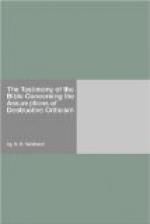In reply let it be said:
1. The denial of the existence of Hebrew literature prior to the exile is thoroughly answered and set aside by the records discovered on the Egyptian monuments and writings before and during Israel’s bondage. Many of the critics have found this criticism untenable, and have abandoned it. They have been obliged to concede that Egyptian and Babylonian literature existed long before the time of Moses. The best scholarship of to-day affirms that “the discovery and first use of writing is certainly as old as the time of Abraham.” (See Schaff-Hergoz, Enc. Art. Writing.)
2. If the Bible itself is not a fraud, writing was constantly in use in the time of Moses. See:
(1) Exod. vii. 14: “The Lord said unto Moses, Write this for a memorial in a book.”
(2) Exod. xxiv. 4: “And Moses wrote all the words of the Lord.”
(3) Exod. xxxiv. 27: “And the Lord said unto Moses, Write thou these words.”
(4) Exod. xxxiv. 28: “And he (God) wrote upon the tables the words of the covenant.”
(5) Num. v. 23: “And the priest shall write these curses in a book.”
(6) Num. xi. 26: “They were of them that were written.”
(7) Num. xvii. 2: “Write thou every man’s name upon his rod.”
(8) Num. xvii. 3: “Write Aaron’s name upon the rod of Levi.”
(9) Num. xxxiii. 2: “And Moses wrote their goings out according to their journeyings by the commandment of the Lord.”
(10) Deut. vi. 9: “Thou shalt write them upon the posts of thy house and upon thy gates.”
(11) Deut xi. 20. Repeats the last reference cited.
(12) Deut. xvii, 18: “When he (the king) sitteth upon the throne of his kingdom, he shall write him a copy of this law in a book.”
These are a few out of the many passages in the Pentateuch in which God has commanded his servant to write, and in which it is positively stated that his servant did write. One of two things is certain, either the whole Pentateuch is a fraud, having stated repeatedly that writing was commanded and practiced, or the book is true, and the fraud must be charged to the belated critics.
The reader will see very clearly that the purpose of such criticism is to eliminate the supernatural from the Bible, as has been said, and destroy its certitude.
It is too late in the day for the Professor’s criticism, that Hebrew literature had its first development during the exile. “Stephen full of the Holy Spirit, looking steadfastly into heaven,” read the record of history concerning Moses differently. Stephen could not have heard the Chautauqua lecturer’s statement, for he affirmed that “Moses was learned in all the wisdom of the Egyptians, and was mighty in words and deeds.”




